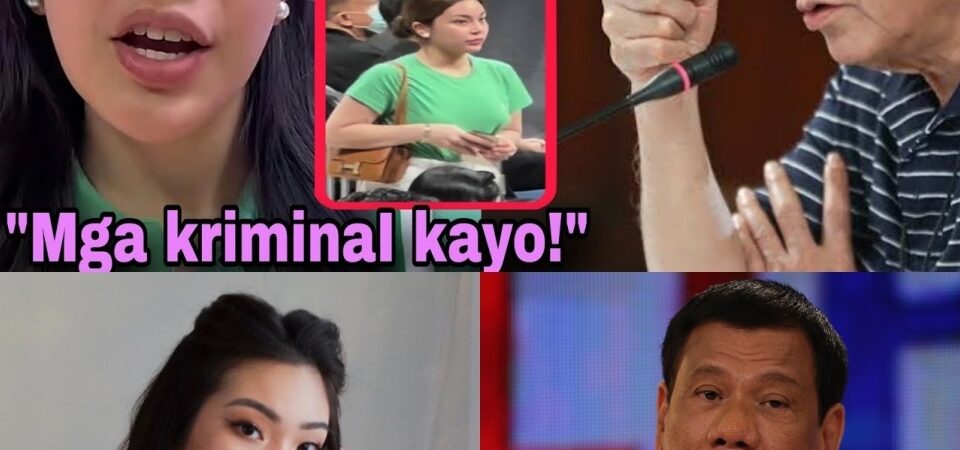In a surprising turn of events, Kitty Duterte, the youngest daughter of former Philippine President Rodrigo “Digong” Duterte and his partner, Cielito “Honeylet” Avanceña, has made headlines by leaving her family home under tumultuous circumstances. This decision comes on the heels of revelations that have significantly impacted her relationship with her family, particularly with her sister, Sara Duterte, and their father. The unfolding drama has sent shockwaves through the Duterte family and captured the attention of the public, igniting discussions about family dynamics, loyalty, and personal choices.
Kitty’s departure from the family home is not just a physical act but a profound statement of her emotional and psychological state. Reports suggest that Kitty has recently come to terms with various aspects of her family’s complex history and political legacy, particularly in relation to her sister, Sara, who is a prominent political figure in her own right. Sara has served as the Vice President of the Philippines, and her rise to political prominence has often been accompanied by a mix of admiration and criticism. Kitty’s decision to leave indicates a struggle to reconcile her feelings about her family’s political involvement and the implications it has on her personal identity.
The relationship between Kitty and Sara has been under scrutiny, especially as Sara has taken on a significant role in the political landscape. Public perception of Sara has been shaped by her strong personality and political acumen, but Kitty’s perspective is likely more nuanced. Growing up in the shadow of a politically powerful family can create a complicated dynamic between siblings, particularly when one sibling is actively engaged in the political arena while the other is attempting to carve out her own identity. Kitty’s departure may symbolize her desire to assert her independence and distance herself from the political turmoil that has surrounded her family.
In her absence, social media has erupted with speculation about the reasons behind Kitty’s decision. Many have expressed support for her, praising her courage to step away from a situation that may have felt suffocating or overwhelming. Others have criticized her for leaving, arguing that family loyalty should take precedence over personal feelings. This divide in public opinion highlights the complexities of familial relationships, especially when intertwined with issues of power, politics, and public scrutiny. Kitty’s situation is a reflection of the broader societal challenges faced by individuals who grow up in politically influential families, where personal desires often clash with societal expectations.
While the specific details surrounding Kitty’s departure remain largely undisclosed, it is clear that her decision has prompted a wave of reflection among the Duterte family and their supporters. The dynamics within the Duterte household are complex, marked by love, loyalty, and the weight of expectation. Kitty’s actions may serve as a catalyst for deeper conversations about the impact of political legacies on personal relationships, particularly within families that have been thrust into the public eye. As more information emerges, it may become clearer how Kitty’s departure will influence her relationship with her father and sister moving forward.
In the wake of her departure, various members of the public and political analysts have begun to speculate on the future of the Duterte family. The implications of Kitty’s choice extend beyond her immediate family; they also raise questions about the political landscape in the Philippines and how familial relationships intersect with public service. The Duterte family’s legacy is complex, filled with both achievements and controversies, and Kitty’s decision to leave may signify a shift in how this legacy is perceived by the younger generation. It highlights the possibility of a new narrative emerging from within the family, one that prioritizes individual identity over political affiliation.

Kitty’s departure also resonates with a broader theme of self-discovery and empowerment among young people today. In an age where mental health and personal well-being are increasingly prioritized, Kitty’s choice to leave her family home can be seen as an act of self-affirmation. Many young individuals facing familial pressure often grapple with the need to conform to expectations set by their families, particularly in high-profile situations like the Duterte family. By taking this bold step, Kitty may inspire others in similar situations to seek their own paths and prioritize their mental and emotional health.
Furthermore, the media coverage surrounding this incident underscores the intense scrutiny that public figures and their families face in the digital age. Kitty’s actions have sparked a flurry of speculation and debate, reflecting the public’s insatiable appetite for news about influential families. This scrutiny can be both a blessing and a curse, as it often amplifies personal struggles while simultaneously fostering a sense of community among those who empathize with the individual. Kitty’s experience serves as a reminder that behind the headlines, there are real people navigating complex emotional landscapes.
As the story continues to unfold, it will be interesting to observe how Kitty’s departure impacts her relationship with Sara and Digong. The Duterte family has weathered numerous storms, both politically and personally, and this latest episode adds another layer to their already intricate dynamic. In the coming weeks and months, there may be opportunities for reconciliation, healing, or further estrangement. Regardless of the outcome, Kitty’s decision to leave signifies a critical juncture in her life, one that may ultimately lead to greater understanding and acceptance of her own identity.
While the public discourse continues to swirl around Kitty Duterte’s departure, it is essential to approach the situation with empathy and understanding. Family dynamics, especially in politically charged environments, are rarely straightforward. Kitty’s journey is a poignant reminder of the complexities inherent in familial relationships and the importance of self-advocacy. As she navigates this new chapter in her life, it is crucial to respect her choices and recognize the courage it takes to step away from a familiar environment in search of personal fulfillment and identity.
In conclusion, Kitty Duterte’s decision to leave her family home after learning more about the intricacies of her family dynamics, particularly regarding her sister Sara and father Digong, has sparked significant public interest and debate. This moment in her life encapsulates the struggle between personal identity and familial loyalty, a theme that resonates with many individuals navigating similar challenges. As the Duterte family continues to evolve, Kitty’s choice may serve as a catalyst for change, prompting deeper conversations about the impact of political legacies on personal relationships and the importance of carving out one’s own path in life.



